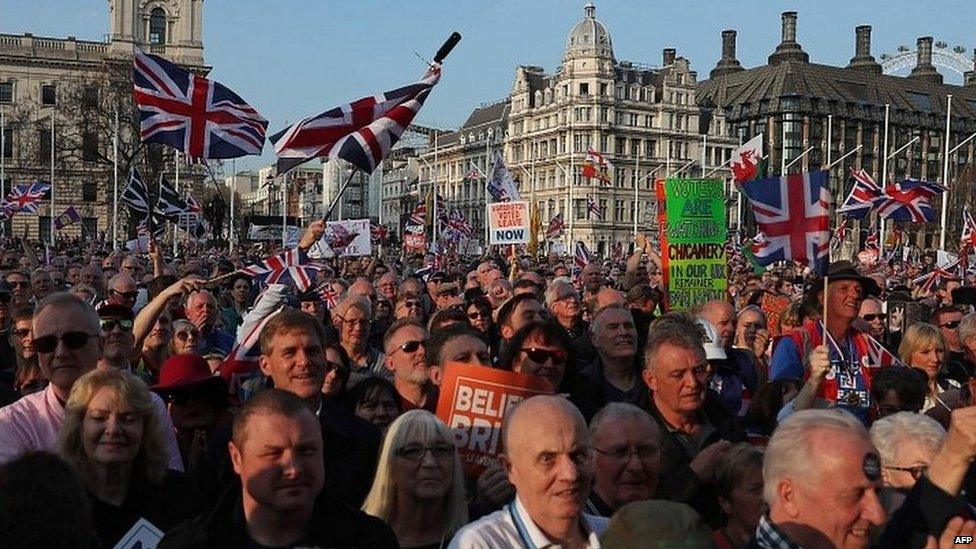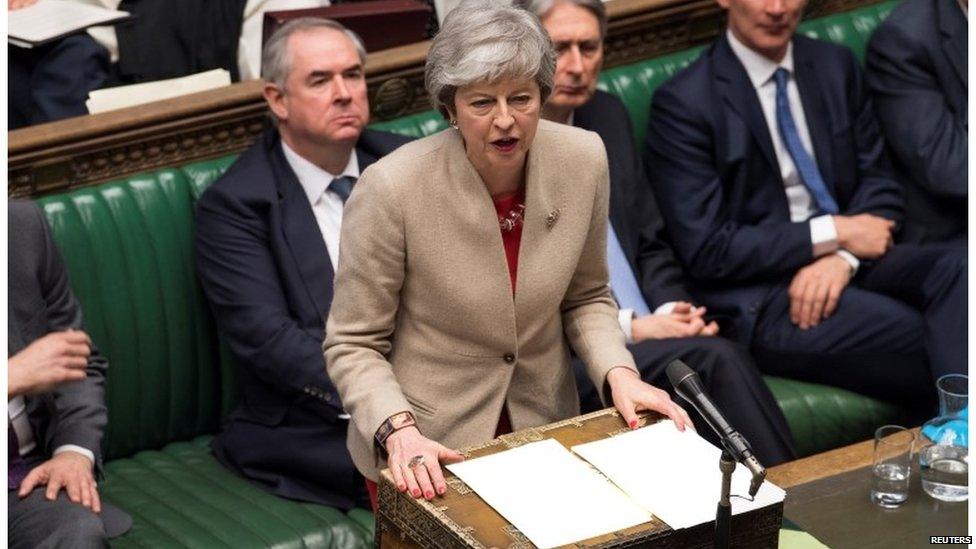Brexit: What happens next after latest government defeat?
- Published

The UK was supposed to leave the EU on 29 March but it is no clearer when Brexit will happen
MPs have rejected the government's EU withdrawal agreement, by a margin of 58 votes.
The UK was supposed to leave the EU on Friday but, following the government's latest setback, it is no clearer when Brexit will happen.
The UK faces a new deadline of 12 April to come up with a way forward.
By that point, the UK must have approved any deal or decided whether it wants to leave without a deal, which Parliament has said no to, or is prepared to delay Brexit by a much longer period, potentially into next year.
The EU is planning an emergency summit on 10 April to discuss its next move. So where does the process go from here?
Indicative votes - phase two (Monday and Wednesday?)
All eyes will be on the Commons on Monday, when MPs resume their attempt to build a consensus around a form of Brexit they find acceptable.
The first instalment of the so-called indicative votes process on Monday was not wholly successful.
MPs didn't back any of the eight options that were put before them, even though many of them had a free vote and were not forced to follow party orders.
However, some propositions fared better than others, with calls for the UK to agree a permanent customs union with the EU only being rejected by six votes.
MPs will have another go on Monday to try and overcome their differences and break the deadlock.
Assuming MPs agree to the required business motion, the proceedings will begin at about 18.00 BST, with voting taking place at about 20.00 BST using the same paper ballot format as last week.
MPs will get to table individual motions and it will be up to Commons Speaker John Bercow to decide which options are discussed and voted on.

It is not clear how many proposals there will be but it is thought supporters of a "softer Brexit" than the PM's deal will look to join forces and combine elements of separate proposals to try and broker a compromise.
However, any plan including a customs union will require more Conservative support than it has hitherto enjoyed and the government has explicitly ruled out the idea up to now.
A motion calling for any deal approved by Parliament to be endorsed by the public in a confirmatory referendum is expected to return in some form. 268 MPs voted for it last time although, again, the majority of Tories and many Labour MPs remain opposed.
The BBC's political correspondent Alex Forsyth said if a majority of MPs ended up backing either a customs union or referendum on Monday, senior government sources aren't ruling out the idea of a run-off, giving MPs a straight choice between that and the PM's Brexit plan.
Three other motions have already been tabled:
Parliamentary supremacy: The idea of the SNP's Joanna Cherry, this would give MPs a vote on whether to back a no-deal exit if, 36 hours before the UK's departure, no extension was on offer. If they rejected that, the government would then be obliged to revoke Article 50 and stop Brexit pending a public inquiry into a deal that could command public support, which could then be put to a referendum
No deal: Conservative John Baron says the UK should leave the EU without a deal in the absence of any withdrawal agreement
Backstop exit: Another proposal from Mr Baron would see the UK have the unilateral right to leave the Irish backstop at a time of its choosing
If MPs are unable to coalesce around any proposal on Monday, it is possible that the process could continue on Wednesday, subject to the approval of the House and anything the government does in the meantime.
Meaningful Vote Three?

Could the prime minister have another go at getting her deal through?
The signals coming from Downing Street is that they are not going to do anything dramatic before Monday and will wait to see what emerges from the Parliamentary process.
Downing Street is reiterating the point that any scenario which would see the UK leave with a deal - which is what the majority of MPs say they want - requires MPs to eventually agree to the current withdrawal agreement.
Discussions with the Democratic Unionists aimed at trying to get them on side are likely to continue although attempts to get any legally-binding changes to the backstop, as the DUP want, would seem to be fruitless.
Not only does Number 10 face a race against time but it also has to meet Speaker John Bercow's test that MPs cannot be asked to vote on the same - or substantially the same - Brexit proposition more than once.
MPs have already rejected the overall Brexit deal twice, in "meaningful votes" one and two.
That is why the government separated the withdrawal agreement, the terms of the UK's exit, from the political declaration about future relations and only asked MPs to vote on the former on Friday.
Although that strategy failed, Downing Street sources have suggested things are moving in the "right direction" and one option would be for ministers to bring forward the legislation needed to implement the UK's exit next week.
The thinking is a vote on the second reading of the Withdrawal Bill - the traditional first hurdle for any legislation to pass - could become the third "meaningful vote" on the deal.
But Downing Street sources said they had not seen anything to suggest that was being discussed at this stage. As ever with Brexit, it seems, it remains a waiting game.